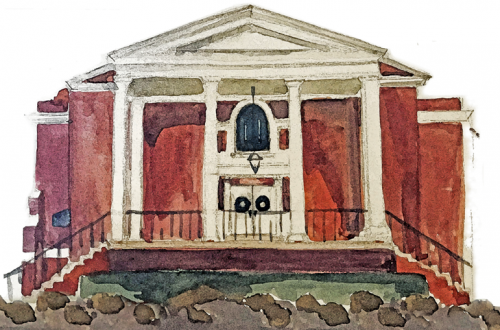D. A. Carson offers a counterpoint to Mark Driscoll’s remarks about the state of the church in England. D. A. Carson is responding to an interview that you can download here or listen to below.
[audio:http://media.premier.org.uk/unbelievable/a2f28d73-4770-4e0b-b255-7ac5ef1ec0e0.mp3]Driscoll’s response to the interview is here.




5 Comments
Henry
As a Brit, I listened to the whole interview yesterday and must say I agree that Driscoll’s interviewer treated him with very little courtesy or respect, often giving a dismissive and patronising ‘hmm’ where Driscoll said something he was not comfortable with and continually presenting Driscoll’s views very uncharitable ways.
I found this surprising given his particularly polite demeanour I have heard in the past (e.g the Rob Bell – Adrian Warnock debate). It turns out the interviewer is not actually a solid evangelical at all, he does not hold to PSA, he does not believe in the historic understanding of hell and his wife also happens to be his pastor!
Unfortunately Driscoll says a lot that is true in this interview, the UK is filled with churches who avoid saying anything controversial from the pulpit like the plague and consequently there is a dearth of masculinity in the British church, it only manages to cultivates the limp-wristed character it models. There are some exceptions, but too few.
Driscoll did lose his cool a bit in the interview, which I fully sympathise with. I would have been tempted to strangle Mr Brierly for his mushy and mollycoddled basis for his beliefs. And Driscoll keeps making the poor argument that big crowds always indicates God’s approval on something and did not answer Brierly’s question on double predestination well at all.
I hope that if dear Mr Brierly is a genuine believer that he would come to know the Lord of Truth more deeply.
Timothy
For the record, Brierly does accept PSA but as one of many ways of describing what the cross achieves.
Henry
Thanks for the correction Timothy. It is true that Mr Brierly does not come out and outright deny PSA, and he even eventually affirms it after much pressing by Driscoll.
I would add though that Mr Brierly’s comments on PSA are very limp and he hems and haws.
He thinks PSA is a “valid way of looking at the cross” but that there is a whole “spectrum of ways” and that PSA “is not the only [way?]”.
I think it would be hard to conclude that Mr Brierly “holds” to PSA in the sense conservative evangelicals do. I can’t imagine that he would have much problem with NT Wright’s views, for example. It seems more a case of him not having a problem with other people holding to PSA it if they want and he’s willing to go along with it to a certain extent (at least in this interview).
In one of his comments he goes even further suggesting he probably dislikes the traditional view when he says he is uncomfortable with some presentations of PSA which he said are in danger of coming across as ‘sado-masichistic’, if I recall. Whose view would he be directing that to?
Timothy
What are the views of NT Wright? I thought he affirmed PSA; certainly he affirms the use of the word propitiation. You imply that Wright’s views are notably defective.
Also does anyone deny that PSA is one of a range of valid views of the atonement? In the volume on PSA, Pierced for Our Transgressions, PSA is held up as the most important but not as the only. For instance they accept representative atonement.
Henry
Timothy, long delay in response to your comment I know,
I was under the impression that NT Wright’s views on justification meant he did not accept PSA. I have not read enough to say, but I came across this article by Trevin Wax that says Wright actually does believe PSA (as you say):
http://thegospelcoalition.org/blogs/trevinwax/2007/04/24/dont-tell-me-nt-wright-denies-penal-substitution/?comments#comments
If that is the case then I apologise and retract my words with respect to that point. Really I do not know enough on the subject to pass judgement.
Regarding Brierly and PSA being a ‘valid way of looking at the cross’ but that there is ‘a whole spectrum of ways’ I understood him to be saying that although it is a valid view it is not necessarily correct. I inferred this because he seemed a little uncomfortable with PSA and was very hesitant to affirm it. I realise his words could rather be interpreted in the sense you are indicating, and you may be correct. I’ll not be dogmatic on that point.
Regards,